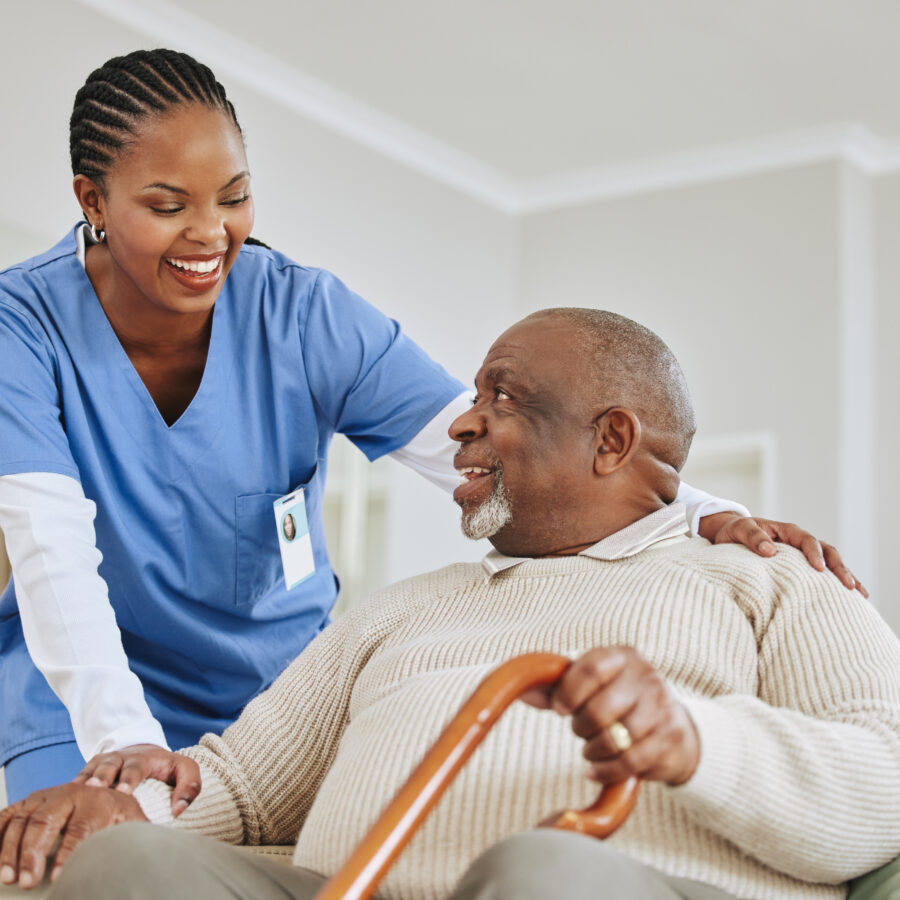When it comes to finding at-home care for seniors in the comfort of their own homes, there are two primary types of services available. Although they’re very different in the scope of service they provide, both can be helpful for older adults and their families.
Different Types of At-Home Care for Seniors
The difference is based on the level of care and service required. Do Mom and Dad just need a little help with activities of daily living to maintain their independence and keep their lifestyle the way it has been, or do they need actual health-related assistance?
- Caregiver Services, also known as Private Duty services, provides basic help for seniors who live independently but could use a hand with routine activities, including completing chores and tackling everyday tasks like shopping and cooking, or who simply would benefit from some companionship. Caregivers help people who need a hand to remain independent and safe in their own home.
- Skilled In-Home Care is full-service home health assistance provided by multidisciplinary teams which could include registered nurses, physical, occupational and speech therapists, home health aides and social workers.
In some situations, a senior who has had a health-related issue will benefit from receiving both skilled in-home care and basic caregiver services simultaneously as they navigate the road to recovery.
“Hiring for private duty assistance with activities of daily living is typically paid out of the person’s pocket (Private Pay), but when eligible, Medicaid may also sometimes pay for these services,” says Missy McAuley, RN, Director of St. Andrews & Bethesda Home Health and Bethesda Hospice Care. “Receiving skilled Home Health Care is reliant on a physician’s order, follows state and government regulations, and is paid for through an insurance provider.”
Many senior living care and service organizations, including Bethesda Health Group, a non-profit in the St. Louis area, provide both types of in-home services – three if you include Hospice Care. In the case of Bethesda, the Private Duty service is called Senior Support Solutions. Regardless, these services make sure that the seniors served by Bethesda are covered with any sort of assistance they may need.
For patients in need of Home Health care, a doctor’s order is needed and a social worker helps with more acute care needs and assists in establishing support.
Contrast that with Private Duty services, in which no doctor’s order is needed and the client is provided with non-medical tasks to help with their activities throughout the day. “We offer assistance with dressing, showers, meal prep, medication management, light housekeeping, escorts to doctor appointments, walking pets and checking in on them, as just a few of the services that we provide,” says Marcella Kuhn, Senior Operations Manager of Bethesda Senior Support Solutions.
What are some things skilled in-home care workers do for seniors?
- Make sure they’re eating healthily and following dietary guidelines set by the physician.
- Check their blood pressure, temperature, heart rate, and respiratory levels as related to the Primary Diagnosis.
- Check that they’re taking prescribed medications, other drugs and any treatments correctly and as ordered.
- Make sure any pain they have is managed.
- Inspect seniors’ homes to make sure they’re safe.
- Teach Mom and Dad how to care for themselves so they can safely age in place.
- Coordinate care by serving as a communication bridge between patients, physicians and other care providers.
How do you establish home health care for your senior loved one?
“If a senior is being discharged from a hospital or a rehab facility, or has had a recent change in condition, whether from a fall, new medication, new medical diagnosis, or something similar, then a physician would send a referral through written order for home health care,” says Missy. “We would provide care under physician orders, which would be paid for by insurance.”
What if you don’t know what sort of care would be best for Mom or Dad?
“The best way to get answers is to speak with the primary care provider and, typically, there is a social worker that will help guide and direct the family in the right direction,” Missy says. “This is also the process for those whose physical abilities have changed, most likely due to a stay in the hospital or rehab facility. Either a discharge planner or social worker will discuss these options with the patient and their family and set up care, based on the results of the conversation.”
Looking to learn more?
Marcella said that most organizations do not have staff members to help families understand what their senior loved ones need. “At Bethesda, we are leading the way by providing complimentary assistance for our residents through our Care Management program,” she says. “It’s a wonderful service, and one I can’t recommend enough for people to use.”
Want to find out more?
If you’d like to stay up to date with Bethesda Health Group, sign up here to receive our blog and newsletters!
"*" indicates required fields
Related Articles
Want to find out more?
If you’d like to stay up to date with Bethesda Health Group, sign up here to receive our blog and newsletters!
"*" indicates required fields



